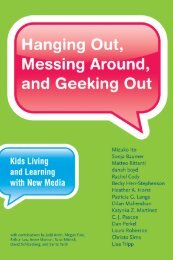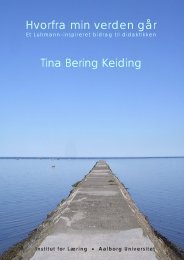T. Kurbanownation may rest in the variety of reasons. The majority of my student-respondents werethe first-year students, who were just starting their university education. The curriculumand new conditions of studying at the university may seem to the students sooverwhelming, that they do not feel they have time, need, or motivation for additionalself-study. The few students, who reported to participate in informal learning online,actually were the students of final years, more seasoned in learning, more independent,and being closer to the beginning of their professional careers. Another explanationmay consist in lack of experience of networked learning: students may just not knowthat they can join learning communities online and study together and from each other.Yet another reason, the most difficult to surmount, lies in the nature of traditional academiccourses, with many of them still being rather material- than learner-centered,with the content mostly provided by a teacher, and students being passive recipients ofthe learning material. In such educational systems students have no chance to exploretopics of their learning interest, and they may be not motivated enough to pursue theindividual informal learning. Anyway, the interview results demonstrate, studentrespondents'PLEs are deprived of the element of informal learning and informal learningcommunities, though the digital component of formal learning is quite welldeveloped.Students seem to be good learners mostly when being guided.The analysis of the teacher-respondents' answers indicates they are confident atfinding additional resources to enrich the educational content of the university coursethey teach, either in libraries databases, or full-text educational content. Nevertheless,when it comes to sharing the materials on the Internet or participating in the creation ofthe online resources, the teacher-respondents contribute to it only indirectly: if the resourcesthey created do appear online, it is not initiated by them, but is rather acceptedby them as an inevitable fact. The teacher-respondents turn out to be the consumers ofthe Internet educational content, but not the producers. In general, the teacherrespondentsseem to be rather passive viewers than active participants on the Internet,at least in comparison with the student-respondents: the former e-mail, socialize, commentin communities less than the latter. Although only one-third of the teacherrespondentsreport to build online professional connections in the communities oflearning, it should be kept in mind that it is difficult for the teacher-respondents to differentiatebetween informal learning and entertainment: these two activities penetrateinto each other. Only one teacher-respondent reported to have taken a Massive OpenOnline Course and be the member of the educational community Coursera. No teacherrespondentsprovide a personal blog. From those facts, another observation relating thecomputer-mediated communication occurs: contrary to the student-respondents, theteacher-respondents definitely prefer one-to-one e-mail contacts to many-to-many conversationmode on forums of educational networks or interest-based communities.Summarizing, teacher-respondents' PLEs do contain certain digital elements relevant totheir work, informal learning (professional growth), and communication, but theirPLEs are also considerably based on traditional components.75
Personal learning environments of polish academic participantsThe general conclusion from the study is that the respondents do not wholly realizethe learning potential the Internet offers. Obviously, though students are good at guidedlearning and familiar with the Internet services and tools, the realm of their self-studyremains unrealized, at least online. Learning appears to be rather an individual experience,while entertaining is shared. The same is true about the teachers: very few treatthe Internet as the new settings for professional growth and informal learning. Theteachers seem to treat the Web primarily as a huge repository of useful resources, andonly in some measure as the medium for social academic interaction. Learning seemsto be still traditionally tied to the classroom and university premises.5. Conclusion.Evidently, my research group was very limited. As follows, the interview resultscan be treated only as the attempt of a preliminary insight into the subject matter,which could prepare ground for a more in-depth and structured case-study. It is difficultto predict, if comparable results would be obtained within a more numerous orhomogeneous research group, or with respondents belonging to the same field ofknowledge. It would be interesting to compare Personal Learning Environments of lessexperienced learners, e.g. first-year students, with that of more seasoned learners, e.g.students on Master's or PhD programmers, or contrast the Personal Learning Environmentsof students and teachers, or of learners coming from different educational systems.Such study would allow to make conclusions about PLEs elements and theirdevelopment over time and experience, and consequently to work out strategies how toguide students in constructing better-designed and more sophisticated PLEs to be utilizedby them in after-university careers for lifelong learning and knowledge update.It is an obvious fact that with every decade, education is becoming more digitized,and the accents are being shifted from guided learning supervised solely by the teacherand the rigid curriculum to the more independent learning, initiated by students, wherelearners' personal educational preferences are taken into account. Personal LearningEnvironments have the power to unite formal and informal learning, expand learningbeyond the classroom, connect different types and episodes of learning, as well as theyoffer learners the tools for sustainable lifelong learning. Hence, I am deeply convincedPersonal Learning Environments deserve further research and wider application notonly in informal learning, but in institutional education as well.6. References:1. Attwell G. (2007). Personal Learning Environments – the future of eLearning?,„eLearning Papers”, Vol. 2, No 1, ISSN: 1887-1542., pp. 1-8, available online at:www.elearningpapers.eu (accessed April 2014).76
- Page 2 and 3:
VIA UNIVERSITY COLLEGEDENMARKCREATI
- Page 4:
Table of contentIntroduction . . .
- Page 7 and 8:
the reader toward better perception
- Page 9 and 10:
Enhancing the Global Classroom for
- Page 11 and 12:
Enhancing the Global Classroom for
- Page 13 and 14:
Enhancing the Global Classroom for
- Page 15 and 16:
Enhancing the Global Classroom for
- Page 17 and 18:
Enhancing the Global Classroom for
- Page 19 and 20:
Enhancing the Global Classroom for
- Page 21 and 22:
Enhancing the Global Classroom for
- Page 23 and 24:
Methodology of enterpreneurship tea
- Page 25 and 26: Methodology of enterpreneurship tea
- Page 27 and 28: Methodology of enterpreneurship tea
- Page 29 and 30: Methodology of enterpreneurship tea
- Page 31 and 32: Methodology of enterpreneurship tea
- Page 33 and 34: Methodology of enterpreneurship tea
- Page 35 and 36: Methodology of enterpreneurship tea
- Page 38 and 39: CREATING ENTREPRENEURIAL MINDSETCHA
- Page 40 and 41: A. Ziółkowski, K.Ziółkowskidedi
- Page 42 and 43: A. Ziółkowski, K.ZiółkowskiThe
- Page 44 and 45: A. Ziółkowski, K.ZiółkowskiFig.
- Page 46 and 47: A. Ziółkowski, K.ZiółkowskiFig
- Page 48: 9. ReferencesA. Ziółkowski, K.Zi
- Page 51 and 52: Design of a learning process for SM
- Page 53 and 54: Design of a learning process for SM
- Page 55 and 56: Design of a learning process for SM
- Page 57 and 58: Design of a learning process for SM
- Page 59 and 60: Design of a learning process for SM
- Page 62 and 63: CREATING ENTREPRENEURIAL MINDSETCHA
- Page 64 and 65: T. KurbanowOERs are Massive Open On
- Page 66 and 67: T. Kurbanowdictionaries, word lists
- Page 68 and 69: T. KurbanowDoctor's Degree (28%). 5
- Page 70 and 71: T. KurbanowFig. 3. Categorization o
- Page 72 and 73: T. KurbanowThe next question was re
- Page 74 and 75: T. KurbanowFig. 8. Services and sof
- Page 78 and 79: T. Kurbanow2. Britt A.M., & Gabrys
- Page 80 and 81: CREATING ENTREPRENEURIAL MINDSETCHA
- Page 82 and 83: V. Marcinovátime, tomorrow each pe
- Page 84 and 85: V. MarcinováIt is difficult to qua
- Page 86 and 87: V. Marcinovádevelopment. It is evi
- Page 88 and 89: V. Marcinováincreases the rate of
- Page 90 and 91: V. Marcinovámaking perspective. Hu
- Page 92 and 93: CREATING ENTREPRENEURIAL MINDSETCHA
- Page 94 and 95: J. Czerna-Grygielate an organizatio
- Page 96 and 97: J. Czerna-GrygielMillward Brown SMG
- Page 98 and 99: J. Czerna-GrygielEducation continui
- Page 100 and 101: J. Czerna-Grygielis the implementat
- Page 102 and 103: J. Czerna-GrygielResearch conducted
- Page 104 and 105: CREATING ENTREPRENEURIAL MINDSETCHA
- Page 106 and 107: H. KrukOther principles connected w
- Page 108 and 109: H. Kruk2014/2015 while some for pre
- Page 110 and 111: H. Krukin programmes in economics f
- Page 112 and 113: H. Krukplaces”, “Fuel and energ
- Page 114 and 115: H. Krukuniversities of technology a
- Page 116 and 117: CREATING ENTREPRENEURIAL MINDSETCHA
- Page 118 and 119: S.BadowskaWith this approach, resea
- Page 120 and 121: 4. Results and discussionS.Badowska
- Page 122 and 123: S.Badowskaown professional interest
- Page 124 and 125: S.BadowskaAn academics’ propensit
- Page 126 and 127:
S.Badowskaacademic staff will spend
- Page 128 and 129:
S.BadowskaSecondly, tested research
- Page 130 and 131:
S.Badowska13. Kruss G. (2012). Reco
- Page 132 and 133:
AbstractsAbstractsChapter 1. Bryan
- Page 134 and 135:
Abstractstransfer a certain body of
- Page 136 and 137:
Abstractsinclude courses concerning





